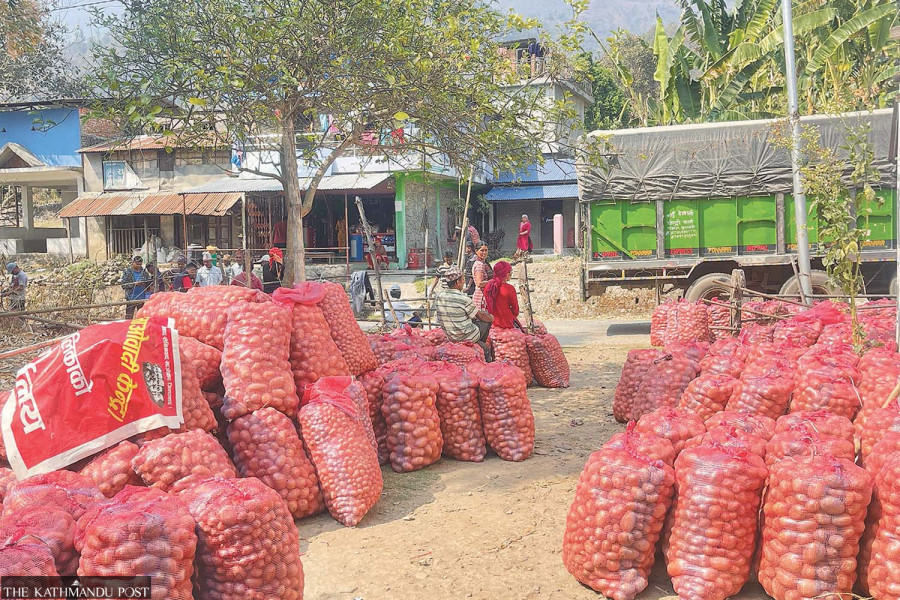Money
Bumper potato harvest brings joy to farmers
In addition, farmers in Lamjung in western Nepal have received a higher price for the vegetable this season.
Aash Gurung
Thanks to a favourable climate, farmer Bhagwati Kandel rejoices at this season’s bumper potato harvest. His profits have also grown, with the vegetable fetching better prices this year.
Potatoes are a superfood rich in essential vitamins and minerals and high in calories. As green vegetables have become prohibitively expensive for some, potatoes fill the vacuum and grow in demand.
Potato farmers in Rainas Municipality generally sell their produce at nearby markets. This year, however, the situation is quite different.
Vegetable traders are arriving at the farmers' doors to buy potatoes, a versatile food.
Kandel of Rainas Municipality Ward 4 produced 16 tonnes of potatoes on her 10 ropanies.
She sold 8 tonnes at Rs23 per kg from the field. The government also provided Rs2 per kg to potato farmers as an incentive to grow the vegetable.
Kandel was encouraged to cultivate potatoes after the Agriculture Knowledge Centre provided seeds at a 75 percent subsidy and trained farmers on responsive pest management technology.
The result was a bumper harvest. She earned Rs200,000, including the government subsidy.
Shiva Adhikari of Sundarbazaar Municipality Ward 10 produced 4 tonnes of potatoes. He sold 3 tonnes and earned around Rs86,000.
This season, Adhikari and 40 other farmers associated with the Bhagyodaya Farmers Group produced 50 tonnes of potatoes. Nearly half the output sold from their fields for a total of Rs555,450.
The remaining potatoes were sold for the market price, ranging from Rs30 to Rs40 per kg. Kandel said that the farmers got better prices by selling the potatoes in retail.
In the hills and mountains, planting starts in November, and harvesting is done usually in June. The potatoes cultivated in upper areas from January to February are harvested in June.
Sudip Khatiwada, senior plant development officer at the Agriculture Knowledge Center, said that farmers in three municipalities—Rainas, Sundarbazaar, and Madhyanepal—produced 474 tonnes of potatoes on 509 ropanies this year.
They sold 247 tonnes and earned Rs5.72 million.
Potatoes continue to be crucial to global food security as a key diet to fight hunger and poverty.
Khatiwada said that the local government is encouraging farmers to produce more potatoes due to their market value and growing demand.
“Farmers sell their crops to wholesalers. They get even more value if they sell to retailers.”
In retail, potatoes fetch up to Rs40 per kg. “In Lamjung, farmers in eight different groups earned more than Rs10 million this season,” Khatiwada said.
According to the centre, 59 farmers of Rainash Municipality-4 produced 152 tonnes of potatoes. Of these, 88 tonnes were sold from the farm for Rs2.38 million. The farmers also received Rs177,300 in subsidies from the Agriculture Knowledge Centre.
According to the Ministry of Agriculture and Livestock Development statistics, potato is grown in Nepal on 198,256 hectares, with an annual yield of 3.41 million tonnes.
In Lamjung, potato is produced on 1,975 hectares with an annual output of 38,500 tonnes.
Ishwor Gurung, another potato farmer, said that in Lamjung, farmers in the lower altitudes usually grow winter potatoes. Potatoes are grown in the rainy season in the upper reaches, where temperatures are low.
“We have harvested potatoes and are selling them currently,” Gurung said.
Potatoes are one of the world's most important food crops. Experts say potato production must be adapted to climate change to avoid reductions in crop yield.
Increased atmospheric carbon dioxide concentrations are predicted to benefit potato plants and crop yields. The major benefit of this phenomenon for potatoes is an increase in their photosynthetic rates, which can increase their growth rates.
In Lamjung, according to Khatiwada, the production is sometimes different.
“The production cost is high. Most of the time, farmers have to bear losses if the output declines due to pests,” said Khatiwada. “We have assisted farmers by providing seed and technical know-how.”
“We are also making arrangements for farmers to sign advance contracts with buyers,” he said. Under this initiative, buyers make a purchase agreement with farmers before potato planting.
Khatiwada said this ensures farmers the market for their crop.




 10.12°C Kathmandu
10.12°C Kathmandu.jpg)














